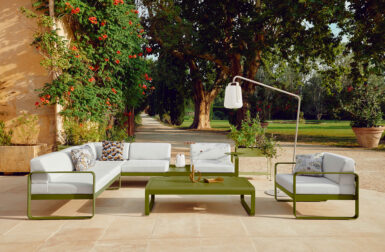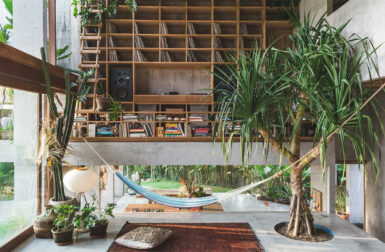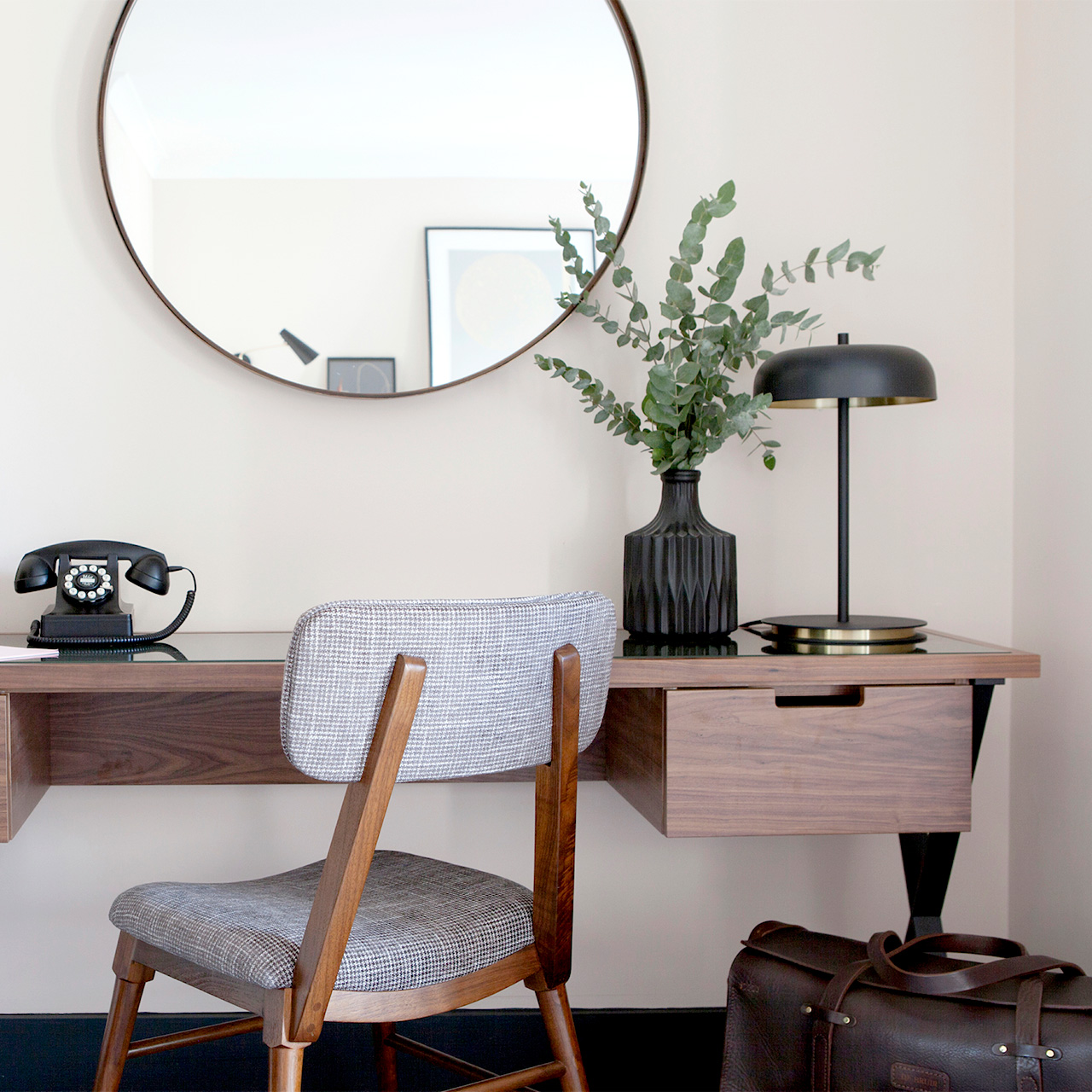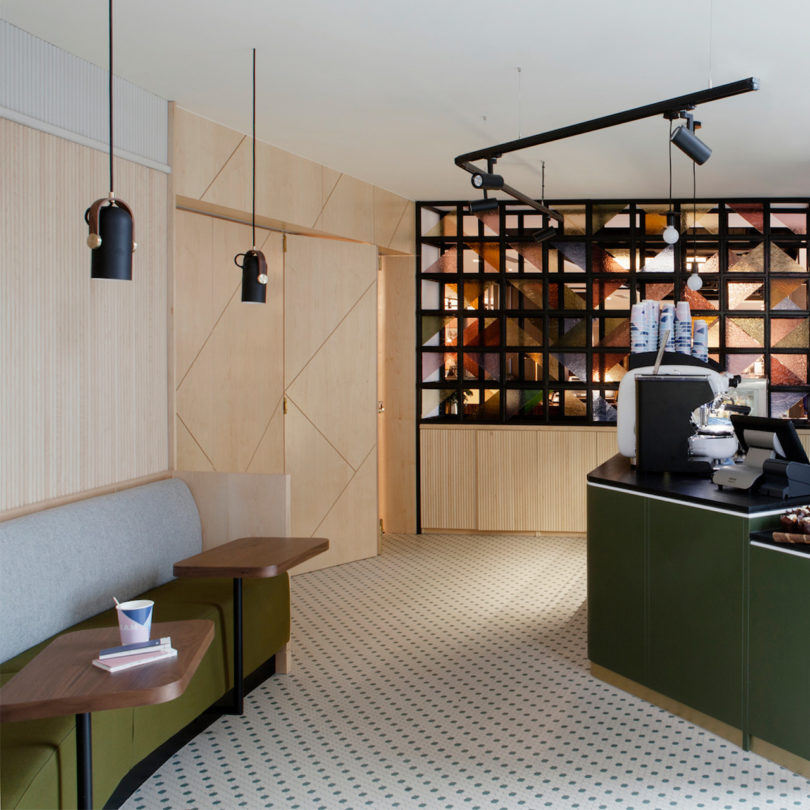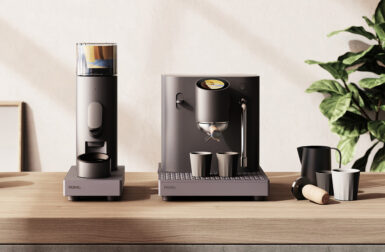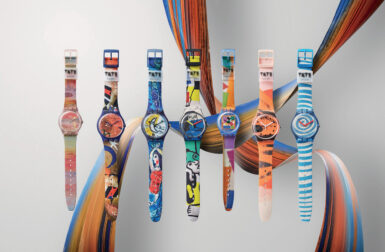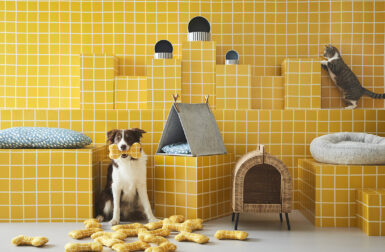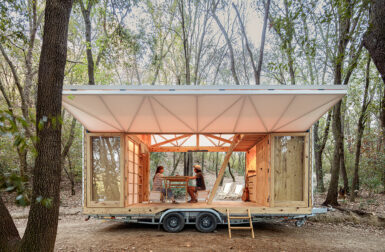Dublin-based interior architectural and design firm 21Spaces has recently transformed one of Dublin’s most established hotels The Alexender into The Alex – a series of contemporary spaces that reflect the changing pace of life in the Irish capital. “The refurbishment of The Alex could not have been better timed,” says founder and director John Henry Boyle. “The demand on a central location and the demographic shift following the relocation nearby of multi-national companies such as Twitter’s European Headquarters has meant that since the redesign The Alex has become a busy and lively all-day destination.”
The concept for the 105-room hotel draws inspiration from the heritage of the local area, including a tramline that once ran right past the hotel, and local 1950s interiors (the building itself only dates from 1990 despite appearing much older). “We went out and looked at the other buildings in the neighborhood, and there were a lot of midcentury references – you pick up on them as you wander the streets – so we combined the industrial story of the tramlines and the design cues in the local architecture,” says project architect Jean Delaney. ” And it’s all custom-made – we worked with as many local craftsmen as we could to create a unique identity.” Alongside custom-made finishes sit high-end interior products such as the Frankie Chair by Stockholm-based Färg & Blanche and coffee tables by Danish brand Gubi, giving the space international appeal.
Moving the hotel’s entrance to the middle of the building, freed up the rotunda for a stand-alone coffee shop, and filled the ground floor with natural light. By changing the flow of the space, 21Spaces made best possible use of the now connected space, creating different focal points, each with its own identity and purpose. In a nod to traditional hotels, newspapers hang suspended on walnut rods to encourage visitors to pop in. Clusters of seating and bespoke rugs, handmade in Dublin by Rugs by Design, encourage interaction between guests and local residents and the space is now a vibrant part of the community.
The ever-increasing trend for hot-desking combined with the more ‘open-doors’ approach in today’s hotels led to the creation of a dedicated library and co-working area within the lobby, which is popular with Twitter employees. The two communal solid walnut desks, which feature natural markings and cracks complete with butterfly ties, were made by craftsmen based in Belfast. Brass Anglepoise lamps and metal legs complete the raw industrial aesthetic. “It was about bringing back the community focus,” says Delaney. “We have had good feedback from the neighbors which is a good thing. Even when it is really busy here, there is somewhere for everyone.”
The restaurant has a softened gentlemen’s club aesthetic, somehow managing to feel simultaneously masculine and feminine. Mid-century detailing with an industrial twist through the use of wood, marble, brass and steel is combined with velvet and fabric upholstery, soft pink and blue textured fabric chairs and dark turquoise velvet and striking maroon banquettes.
Different zones enable the space to be used by guests and locals alike for everything from everyday meals to special events. Grounding this space, and referencing the local industrial heritage, bespoke black lighting tracks and pendant lighting have been used, as well as brass accents from the long brass bar countertop and brass task lights to the brass edging on the silk upholstered wall panels.
The former hotel entrance has been transformed into The Steam Café, a weekday coffee shop run by local artisan coffee roaster, Cloud Picker. The light and airy interior with floor-to-ceiling windows and ash doors paired with distinctive timber dowel clad walls really make the most of the double-height space. The curved design continues in the geometric pattern of the service counter. A slim curved banquette upholstered in Kvadrat tweed – the seat in moss green with a light grey backrest – is combined with fixed tables made from recycled milk bottles. To complete the design, black and steel industrial pendant lighting and a triangle stained-glass panel, again made locally, give the space its own distinct look.
A large customized ticker-tape sign runs the length of the lift area and references the now-defunct tramline that once operated next to this site. “It evokes the feeling of waiting on a platform or in a train station,” explains Delaney.
Every detail has been considered in each of the 105 bedrooms and suites too. Against a backdrop of soft dusty pink walls, velvet cushions and soft wool throws from Foxford Woollen Mill in Mayo, large circular metal mirrors are combined with handcrafted walnut wardrobes and leather headboards made by O’Donnell Furniture Makers in Cork.
Carefully chosen artworks reflect the area’s natural landscape and wildlife – such as Luke Stevenson’s Collection of Showbirds. “We worked closely with an art curator in Belfast who helped us to put the art together,” says Delaney.
What: The Alex, Dublin
Where: The Alex, 41-47 Fenian Street, Dublin, Ireland.
How much? Rooms start at $250 per night
Highlights: Whether you fancy a pint of Irish Guinness or a Manhattan, head straight to the high seats at the bar and you’re set for the night.
Design draw: 21Spaces took inspiration from the local area, turning 1950s design cues and the industrial history of a former tramline into a hotel fit for the 21st century, whether you’re checking in or just checking it out.
Book it: Visit thealexdublin.ie
Photography by Ruth-Maria Murphy.
